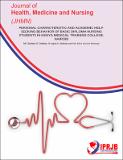| dc.description.abstract | Purpose: This cross-sectional mixed survey sought to describe AHSB of basic diploma nursing students in KMTC, Nairobi, Kenya. The study examined the influence of sources of help, options of help-seeking and personal characteristics on help-seeking behavior.
Methods: Data was collected using self-administered questionnaires. Descriptive statistics and inferential statistics (in particular, the chi-square, Fisher’s Exact and binary logistic regression) were derived from the data. All statistical tests of significance were at 95% confidence level.
Results: the study revealed that 90.9% (n=160) of respondents were adaptive help seekers, 72.8% (n=126) preferred peers to lecturers and 75.6% (n=133) frequently sought help from fellow students, especially during group discussions. By contrast, 54.6% (n=95) of the respondents approached instructors during class or immediately after lesson; with only 24.6% (n=43) engaging lecturers privately. Adaptive help seeking was positively associated with personal factors of self-efficacy (p=0.034), the notion that the student is of equal worth with peers (p=0.038) and a feeling that help seeking is not a sign of weakness. On binary logistic regression, students who felt that seeking help was a sign of weakness were significantly less likely to be adaptive help-seekers. The study concludes that personal factors are significant predictors of adaptive help seeking behavior of student nurses in KMTC Nairobi.
Unique contribution to theory, practice and policy: The research recommends that institutions encourage students to treat peers as people of equal worth; and that seeking help is not a sign of weakness. Moreover, schools should explore ways of increasing help seeking from lecturers, especially in their offices | en_US |

